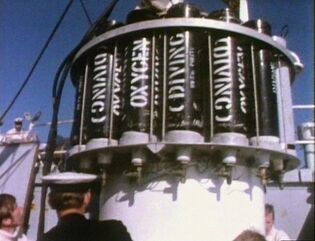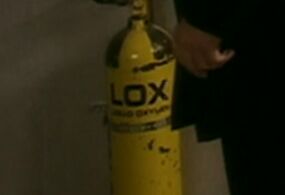Oxygen: Difference between revisions
No edit summary |
No edit summary |
||
| Line 6: | Line 6: | ||
Oxygen, like [[hydrogen]] and [[sodium]], had a unique emission wavelength that could be measured by a [[spectrograph]]. ([[TV]]: ''[[The Sensorites (TV story)|The Sensorites]]'') | Oxygen, like [[hydrogen]] and [[sodium]], had a unique emission wavelength that could be measured by a [[spectrograph]]. ([[TV]]: ''[[The Sensorites (TV story)|The Sensorites]]'') | ||
Oxygen was vital on [[space station]]s and [[spacecraft]] to allow said life forms to breathe. ([[TV]]: ''[[The Moonbase (TV story)|The Moonbase]]'') If a human went without oxygen, they would die within three to four minutes of [[oxygen starvation]], ([[TV]]: ''[[The Seeds of Death (TV story)|The Seeds of Death]]'') though other species (such as [[Time Lords]] or [[Silurians]]) could survive for longer ([[TV]]: ''[[Four to Doomsday (TV story)|Four to Doomsday]]'', ''[[Deep Breath (TV story)|Deep Breath]]''). Some species (such as the [[Pting]]) did not require oxygen to survive, ([[TV]]: ''[[The Tsuranga Conundrum (TV story)|The Tsuranga Conundrum]]'') and yet others (such as [[Mogarian|Mogarians]]) could be poisoned by it. ([[TV]]: ''[[Terror of the Vervoids (TV story)|Terror of the Vervoids]]'') | Oxygen was vital on [[space station]]s and [[spacecraft]] to allow said life forms to breathe. ([[TV]]: ''[[The Moonbase (TV story)|The Moonbase]]'') If a human went without oxygen, they would die within three to four minutes of [[oxygen starvation]], ([[TV]]: ''[[The Seeds of Death (TV story)|The Seeds of Death]]'') though other species (such as [[Time Lords]] or [[Silurians]]) could survive for longer ([[TV]]: ''[[Four to Doomsday (TV story)|Four to Doomsday]]'', ''[[Deep Breath (TV story)|Deep Breath]]''). Some species (such as the [[Pting]]) did not require oxygen to survive, ([[TV]]: ''[[The Tsuranga Conundrum (TV story)|The Tsuranga Conundrum]]'') and yet others (such as [[Rills]] or [[Mogarian|Mogarians]]) could be poisoned by it. ([[TV]]: ''[[Galaxy 4 (TV story)|Galaxy 4]],'' ''[[Terror of the Vervoids (TV story)|Terror of the Vervoids]]'') | ||
[[Earth]]'s atmosphere was 80% [[nitrogen]] and 20% oxygen, which was a sufficient atmosphere for human survival. ([[AUDIO]]: ''[[The Resurrection of Mars (audio story)|The Resurrection of Mars]],'' [[TV]]'': [[The Doctor's Daughter (TV story)|The Doctor's Daughter]]'') | [[Earth]]'s atmosphere was 80% [[nitrogen]] and 20% oxygen, which was a sufficient atmosphere for human survival. ([[AUDIO]]: ''[[The Resurrection of Mars (audio story)|The Resurrection of Mars]],'' [[TV]]'': [[The Doctor's Daughter (TV story)|The Doctor's Daughter]]'') | ||
Revision as of 18:00, 11 August 2024
- You may be looking for the TV story.
Oxygen was an element with the symbol O (PROSE: Christmas on a Rational Planet) and atomic number 8. (TV: Shada)
Oxygen, like hydrogen and sodium, had a unique emission wavelength that could be measured by a spectrograph. (TV: The Sensorites)
Oxygen was vital on space stations and spacecraft to allow said life forms to breathe. (TV: The Moonbase) If a human went without oxygen, they would die within three to four minutes of oxygen starvation, (TV: The Seeds of Death) though other species (such as Time Lords or Silurians) could survive for longer (TV: Four to Doomsday, Deep Breath). Some species (such as the Pting) did not require oxygen to survive, (TV: The Tsuranga Conundrum) and yet others (such as Rills or Mogarians) could be poisoned by it. (TV: Galaxy 4, Terror of the Vervoids)
Earth's atmosphere was 80% nitrogen and 20% oxygen, which was a sufficient atmosphere for human survival. (AUDIO: The Resurrection of Mars, TV: The Doctor's Daughter)
Liquid oxygen could be abbreviated to "LOX". (TV: Dalek)
Chemistry
Hydrogen became very explosive in the presence of oxygen, (TV: Castrovalva) but hydrogen and oxygen made up H₂O. (PROSE: Christmas on a Rational Planet)
Fire could not exist without oxygen, so the presence of fire meant that the immediate area was oxygen-rich. (TV: Empress of Mars)
Vionesium reacted with oxygen to produce light and carbon dioxide in large quantities. (TV: Terror of the Vervoids)
Plant life could use enzymes to convert carbon dioxide into oxygen. (TV: The Ark in Space, Flesh and Stone, In the Forest of the Night)
History
A yellow canister of liquid oxygen was present in Henry van Statten's vault. (TV: Dalek)
Adric, Varsh, and a number of other Alzarians used oxygen cylinders against the Marshmen, causing a change in the atmosphere too quickly for them to adapt to. They then proceeded to flood the ship with the gas, forcing the Marshmen to flee. Their Starliner had an electrolytic power supply, enabling it to create its own oxygen. (TV: Full Circle)
By the 51st century, human space vessels could house oxygen factories in the form of synthetic forests, nicknamed "treeborgs". These used starlight to produce oxygen. (TV: Flesh and Stone)
In the 23rd century, the Eighth Doctor had altered Mars' atmosphere with the atmospheric re-ioniser on Deimos Moonbase to make it the same consistency as that of Earth, saving the human colonists below. (AUDIO: The Resurrection of Mars) Before then, Mars' atmosphere had been largely nitrogen, with virtually no oxygen or hydrogen. (TV: The Savages)
There were oxygen factories on Venus during Empress Vulpina's reign. (AUDIO: Voyage to Venus)
On one day in the 2010s, trees mysteriously grew across all the land on Earth. As the Twelfth Doctor discovered, it was a defence mechanism to protect the planet from the threat of a solar flare with excess oxygen. Once the solar flare struck and the worldwide forest's work of preservation succeeded, it promptly regressed to its former state. (TV: In the Forest of the Night)
On Moonbase Laika in 2070 oxygen levels were measured, alongside with pressure and humidity. All dropped when the Moonbase's dome was breached by the Cybermen. (TV: The Moonbase)
The atmosphere of Izdaal's tomb on Mars, while rich enough in nitrogen for the Ice Warriors to thrive in, also had enough oxygen for humans and Time Lords to breathe. (AUDIO: Red Dawn)
In the caves of Androzani Minor there were low levels of the element. The Fifth Doctor claimed he could go down there because he could store oxygen for several minutes. However, Sharaz Jek gave him an oxygen cylinder the same. Moreover, the Doctor's TARDIS was provided with oxygenators. (TV: The Caves of Androzani)
Qetesh didn't need oxygen to breathe. (TV: Goodbye, Sarah Jane Smith)
Dorothy McShane had an oxygen mask over her nose and mouth as apart of full medical examination to be a passenger on the Virgil. (PROSE: At Childhood's End)
The Dregs required carbon dioxide to breathe and exhaled oxygen as a waste. (TV: Orphan 55)
| ||||||||||||||



